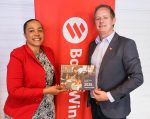During the past five years, the City of Windhoek supplied electricity to about 4,000 households in Windhoek’s informal settlements, City Mayor, Queen Omagano Kamati has said.
Speaking at the ordinary council meeting last week, Kamati emphasised that access to energy is essential for promoting both economic and human development
“Not only does energy help to enhance our daily living circumstances, such as health, and education, but it also helps to stimulate economic activity and create wealth. Electricity also makes internet connectivity possible, and allow children to attend school more regularly, because they are not required to spend hours fetching firewood for lighting,” Kamati said.
Kamati further said, as part of Council electrification projects, a list of crime hotspots in informal settlements has been identified, with the goal to install high mast lights to enhance resident safety and security.
Four high mast lights have already been installed as part of this endeavor during June 2024, and we plan to install fifteen more during the current Financial Year with funding from MURD, MME and KRC. Project activities on the provision of electricity to the neighbourhoods of Okatunda, Okuryangava, Kilimanjaro, Havana Extensions 1, 2, and 3, and Okahandja Park, amongst others, is ongoing.
“However, the provision of electricity to our informal settlements has not been without challenges. Residents are required to sign lease agreements with the City to allow for the orderly development of their neighbourhoods, including the provision of electricity. However, it has come to our attention that some of our residents are unwilling to enter into these lease agreements with Council, leading to obstruction and delays in the completion of electrification projects.
“Another challenge is that some of the lessees are not currently situated on plots allocated to them, while others are situated in approved road reserves. These residents must first be relocated, before our contractors can start with the installation of electricity networks. Unfortunately challenges like these hamper the progress of the electrification of informal settlements and I call on all stakeholders, including community leaders and residents, to assist the City in mitigating these challenges for the sake of effective and efficient service delivery,” Kamati said.
She also went on to say in the area of crime prevention and public safety, she was pleased to mention that the City of Windhoek has made good progress in the installation of advanced surveillance systems featuring motion detection and flexible camera controls.
“These systems, cover key hotspots, including Groot Aub, and are managed from the City Police CCTV Command Centre for precise monitoring. During a joint City Police – Namibian Police Force operation this month, I had the opportunity to familiarise myself with these new technologies, which will no down impact our crime prevention efforts. I invite our residents to work with us to stamp crime out of Windhoek. Report criminal activities to the City Police or the Namibian Police, and do not get involved in unlawful acts under any circumstances.”










